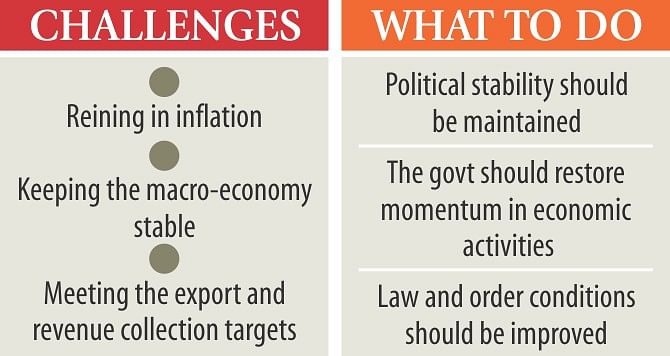Political stability key to higher growth: MCCI
Political stability key to higher growth: MCCI

Bangladesh needs to control inflation, keep the macro-economy stable and meet the export and revenue collection targets to achieve the desired economic growth this fiscal year, a leading chamber said yesterday.
The overall economic condition was positive as indicated by steady improvements in the major economic indicators in the just concluded fiscal year, said the Metropolitan Chamber of Commerce and Industry (MCCI).
Restoring momentum in economic activities and improving law and order conditions will be the other major challenges for the government, which has set the target of achieving 7.3 percent GDP growth in the current fiscal year, the chamber said.
Political stability should also be maintained to achieve the government's growth and inflation targets, the MCCI said in its quarterly review of the economic situation in Bangladesh for April-June.
Adequate infrastructure, energy, skilled manpower and investment-friendly climate are also the key factors for higher economic growth, the MCCI said.
The chamber said point-to-point inflation fell by 1.08 percentage points to 6.97 percent in June this year, from 8.05 percent in the same month last year.
The fall in the inflation rate can be attributed to a massive decline in the non-food inflation, which fell by 2.3 percentage points to 5.45 percent in June 2014, from 7.75 percent in June 2013, it said.
The chamber said growth prospects of the economy are being badly hurt by political uncertainty. “Entrepreneurs, whether local or foreign, are not encouraged to make any new investment in the present political environment,” the MCCI said.
Foreign direct investment fell by $158 million in the first eleven months of last fiscal year, compared to the same period of the previous year, it said.
The chamber said the investors are yet to get back confidence, fearing further political turmoil.
The prospective foreign investors have adopted a 'go-slow' strategy in making fresh investments since 2013, it said. “While public investment has increased, it cannot be an alternative to private investment, which is crucial to accelerating economic growth.”
The damages inflicted by political unrest last year to the national economy also dented the confidence level of the intending investors causing a slower growth in investment in the private sector.
Analysing the last fiscal year's economic situation, the MCCI said the economy experienced stable growth, inflation was under control, the exchange rate remained stable and foreign exchange reserves rose and remained at a comfortable level.
“The international rating agencies have given stable ratings to Bangladesh as they have done for a number of years now.”
The performance of the manufacturing sector needs to be improved by removing bottlenecks in physical infrastructure and the crisis in power and energy supplies, the chamber said.
It said services sectors are doing well but will need government support to be able to recover the losses they suffered during the political crisis last year.
“Violence caused by political unrest hurts economic activities thus hindering growth, and disrupts the supply chain of goods which pushes up inflation.”
The MCCI also made projections on some selected economic indicators for the first quarter of the current fiscal year.
It is assumed that relatively calm political situation will continue in the first quarter of the present fiscal year, the chamber said.
“Therefore, export, import, and remittances will increase further.”
But, the foreign exchange reserve is expected to fall in July and September period due to payment to the Asian Clearing Union against imports.
“The rate of inflation can be expected to go up in July because of increased demand during Ramadan and Eid-ul-Fitr, but fall slightly thereafter.”
The MCCI said, despite political unrest, the agriculture sector recorded 2.46 percent growth in last fiscal year compared to 1.47 percent in the previous year, thanks to steady growth in crop production and output in fisheries and horticulture sub-sectors.
“Continuous government support with inputs and finance will be needed to sustain the sector's growth.”
The stockmarket came out of bearish trends caused by bouts of pre-election violence with the average daily turnover increasing in 2013-14, compared to the turnover a year ago.
Remittance inflows recorded a decline for the first time in 13 consecutive years in last fiscal year. “The decline was due to a shrinking outflow of migrant workers, falling receipts from Middle Eastern nations, appreciation of the taka against the dollar and prolonged political turmoil in some labour importing countries.”
The chamber said exports grew by 3.51 percent month-to-month to $2.8 billion in June 2014 from $2.7 billion, but remained 8.79 percent below the strategic monthly target of $3.07 billion.
“This shortfall was because the country was yet to fully recover from the fallout of the political unrest.”
However, it said, exports rose 8.34 percent in the last quarter of 2013-14. “The export growth was mostly driven by the RMG sector, which, despite political turmoil and labour unrest, registered 13.83 percent growth.”